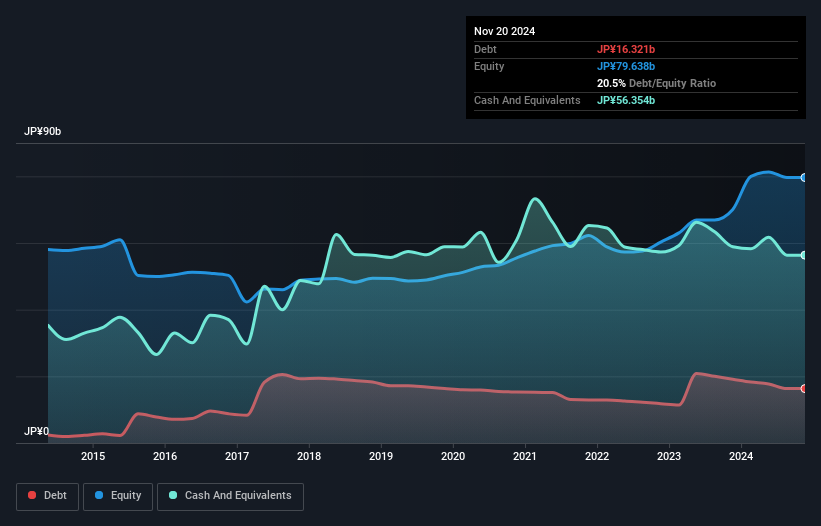ASKUL (TSE:2678) Has A Pretty Healthy Balance Sheet

David Iben put it well when he said, 'Volatility is not a risk we care about. What we care about is avoiding the permanent loss of capital.' When we think about how risky a company is, we always like to look at its use of debt, since debt overload can lead to ruin. Importantly, ASKUL Corporation (TSE:2678) does carry debt. But the more important question is: how much risk is that debt creating?
Why Does Debt Bring Risk?
Debt is a tool to help businesses grow, but if a business is incapable of paying off its lenders, then it exists at their mercy. Part and parcel of capitalism is the process of 'creative destruction' where failed businesses are mercilessly liquidated by their bankers. While that is not too common, we often do see indebted companies permanently diluting shareholders because lenders force them to raise capital at a distressed price. By replacing dilution, though, debt can be an extremely good tool for businesses that need capital to invest in growth at high rates of return. The first step when considering a company's debt levels is to consider its cash and debt together.
See our latest analysis for ASKUL
What Is ASKUL's Debt?
You can click the graphic below for the historical numbers, but it shows that ASKUL had JP¥16.3b of debt in November 2024, down from JP¥19.2b, one year before. But on the other hand it also has JP¥56.4b in cash, leading to a JP¥40.0b net cash position.

How Strong Is ASKUL's Balance Sheet?
The latest balance sheet data shows that ASKUL had liabilities of JP¥107.8b due within a year, and liabilities of JP¥39.4b falling due after that. Offsetting this, it had JP¥56.4b in cash and JP¥68.9b in receivables that were due within 12 months. So its liabilities total JP¥21.9b more than the combination of its cash and short-term receivables.
Given ASKUL has a market capitalization of JP¥157.7b, it's hard to believe these liabilities pose much threat. But there are sufficient liabilities that we would certainly recommend shareholders continue to monitor the balance sheet, going forward. While it does have liabilities worth noting, ASKUL also has more cash than debt, so we're pretty confident it can manage its debt safely.
Fortunately, ASKUL grew its EBIT by 4.1% in the last year, making that debt load look even more manageable. There's no doubt that we learn most about debt from the balance sheet. But ultimately the future profitability of the business will decide if ASKUL can strengthen its balance sheet over time. So if you want to see what the professionals think, you might find this free report on analyst profit forecasts to be interesting.
But our final consideration is also important, because a company cannot pay debt with paper profits; it needs cold hard cash. ASKUL may have net cash on the balance sheet, but it is still interesting to look at how well the business converts its earnings before interest and tax (EBIT) to free cash flow, because that will influence both its need for, and its capacity to manage debt. Looking at the most recent three years, ASKUL recorded free cash flow of 39% of its EBIT, which is weaker than we'd expect. That weak cash conversion makes it more difficult to handle indebtedness.
Summing Up
While ASKUL does have more liabilities than liquid assets, it also has net cash of JP¥40.0b. On top of that, it increased its EBIT by 4.1% in the last twelve months. So we are not troubled with ASKUL's debt use. When analysing debt levels, the balance sheet is the obvious place to start. But ultimately, every company can contain risks that exist outside of the balance sheet. Be aware that ASKUL is showing 2 warning signs in our investment analysis , you should know about...
At the end of the day, it's often better to focus on companies that are free from net debt. You can access our special list of such companies (all with a track record of profit growth). It's free.
New: Manage All Your Stock Portfolios in One Place
We've created the ultimate portfolio companion for stock investors, and it's free.
• Connect an unlimited number of Portfolios and see your total in one currency
• Be alerted to new Warning Signs or Risks via email or mobile
• Track the Fair Value of your stocks
Have feedback on this article? Concerned about the content? Get in touch with us directly. Alternatively, email editorial-team (at) simplywallst.com.
This article by Simply Wall St is general in nature. We provide commentary based on historical data and analyst forecasts only using an unbiased methodology and our articles are not intended to be financial advice. It does not constitute a recommendation to buy or sell any stock, and does not take account of your objectives, or your financial situation. We aim to bring you long-term focused analysis driven by fundamental data. Note that our analysis may not factor in the latest price-sensitive company announcements or qualitative material. Simply Wall St has no position in any stocks mentioned.
About TSE:2678
ASKUL
Provides office supplies mail-order services for small and medium sized offices in Japan.
Flawless balance sheet established dividend payer.
Market Insights
Community Narratives



